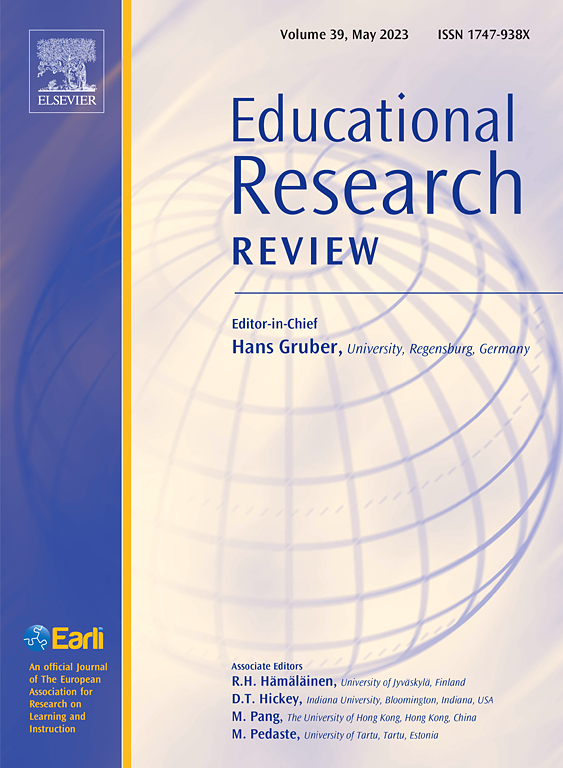通过适应性还是适应性来实现个性化?高等教育模拟学习的元分析
IF 10.6
1区 教育学
Q1 EDUCATION & EDUCATIONAL RESEARCH
引用次数: 0
摘要
本meta分析建立在217项高等教育实证研究的基础上,探讨了不同形式的适应性和适应性在高等教育复杂技能模拟学习环境中作为个性化策略的作用。用于个性化脚手架和任务进展的策略是本meta分析的中心点。我们确定了个性化在高等教育中提高复杂技能的条件。结果表明,虽然适应性(即计算机做出决定)对脚手架更有效,适应性(学习者个人做出的决定)似乎更有利于任务进展。本文认为,适应性和适应性可以有效地用于高等教育中基于模拟的个性化学习环境,以更好地满足不同学习需求的学习者的需求。我们还讨论了人工智能在基于模拟的学习中赋予个性化的潜力。本文章由计算机程序翻译,如有差异,请以英文原文为准。
Personalization through adaptivity or adaptability? A meta-analysis on simulation-based learning in higher education
This meta-analysis builds on 217 empirical studies in higher education and investigates the role of the different forms of adaptivity and adaptability as personalization strategies in simulation-based learning environments for complex skills in higher education. The strategies used to personalize scaffolding and task progression were the central point in this meta-analysis. We identified conditions under which personalization advances complex skills in higher education. The results indicate that whereas adaptivity (i.e., computer makes decisions) is more effective for scaffolding, adaptability (the decisions made by individual learners) seem more beneficial for task progression. We conclude that adaptivity and adaptability can be effectively used to personalize simulation-based learning environments in higher education to better address needs of learners with different learning needs. We also discuss the potential of artificial intelligence for empowering personalization in simulation-based learning.
求助全文
通过发布文献求助,成功后即可免费获取论文全文。
去求助
来源期刊

Educational Research Review
EDUCATION & EDUCATIONAL RESEARCH-
CiteScore
19.40
自引率
0.90%
发文量
53
审稿时长
57 days
期刊介绍:
Educational Research Review is an international journal catering to researchers and diverse agencies keen on reviewing studies and theoretical papers in education at any level. The journal welcomes high-quality articles that address educational research problems through a review approach, encompassing thematic or methodological reviews and meta-analyses. With an inclusive scope, the journal does not limit itself to any specific age range and invites articles across various settings where learning and education take place, such as schools, corporate training, and both formal and informal educational environments.
 求助内容:
求助内容: 应助结果提醒方式:
应助结果提醒方式:


